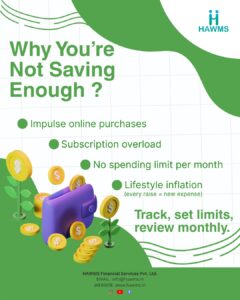Most Indians want to save more but feel stuck. Salaries come in, bills go out, and the balance never grows. This guide explains the real blockers and gives clear money saving tips you can start today.
The Indian context
Costs rise every year. UPI makes spending effortless. Subscriptions keep renewing quietly. Big sales push you to buy today and think later. If you do not control these, savings suffer. Good news. Small fixes, done consistently, can change your numbers in 90 days.

Why savings fall short
1) Impulse online purchases
Apps are designed to make buying fast. The brain likes quick rewards, not patience.
Fix it
-
Turn off one-click buy.
-
Park every “want” in a 48-hour list. If you still want it after two days, then decide.
-
Keep shopping apps off your home screen.
2) Subscription overload
Streaming, cloud storage, diet plans, courses. Ten small charges equal one big leak.
Fix it
-
Export a bank or UPI statement for the last 90 days.
-
Tag every recurring charge.
-
Keep only the two you use weekly. Pause the rest. Most apps let you restart in minutes.
3) No monthly spending limit
If you do not set a cap, lifestyle will expand to fill income.
Fix it
-
Use the 50-30-20 rule as a starting point. Needs 50 percent, wants 30 percent, savings 20 percent.
-
If you already have loans, cut wants to 15 percent until your emergency fund is ready.
4) Lifestyle inflation
New phone, bigger bike, frequent eating out. Every raise becomes a new expense.
Fix it
-
On every salary hike, increase SIPs first, then adjust spending.
-
Use a separate account for investments so the money moves out on payday.
A simple baseline to reset your money
-
Find your real monthly expense
Track every rupee for 30 days. Split into needs, wants, EMIs, and transfers. Without this number, even the best money saving tips will not stick. -
Build an emergency fund
Target 6 months of expenses. Keep it liquid. Use bank FDs or liquid funds. This lets you handle job gaps, medical costs, or repairs without breaking investments. -
Automate your system
SIPs and auto-transfers beat motivation. Set them once. Review every quarter. -
Cut debt with a plan
Pay high interest loans first. Snowball or avalanche method. Close one loan at a time, then roll that EMI into SIPs.
Money Saving Tips for common leaks
Food and groceries
-
Plan meals weekly. Buy once.
-
Use a shared family list to avoid duplicates.
-
Limit food delivery to two times a week.
Transport
-
Combine errands to reduce short rides.
-
Maintain your vehicle on schedule so fuel and repairs drop.
Shopping
-
Follow a one-in one-out rule for clothes and gadgets.
-
Wait for planned festive sales rather than impulse flash deals.
Banking and fees
-
Avoid minimum balance penalties.
-
Use UPI or bank transfers, not costly credit card cash advances.
These small actions turn into real savings in 60 to 90 days.
Money Saving Tips for digital traps
Notifications
Disable non-critical notifications from shopping and travel apps. Fewer pings, fewer temptations.
Trial traps
Add calendar reminders one day before any free trial ends. Cancel unless you are getting real value.
Bundles
Choose family or annual plans only if you track usage. Bundles are cheap only when you actually use them.
Build a budget you can live with
Step 1. Fix savings first
Move a fixed amount on payday. If your take-home is 50,000, auto-transfer 10,000 to a separate savings or investment account.
Step 2. Cap your wants
Keep wants inside a prepaid wallet. When it is empty, stop. This is the simplest of all money saving tips for people who overspend on weekends.
Step 3. Review monthly
On the last day of the month, spend 15 minutes with your numbers. What went up. What went down. What to change next month.
Smart ways to grow savings without pain
-
Round up rule. Every time you spend 920, save 80.
-
Windfall rule. Save 70 percent of bonuses and gifts, spend 30 percent guilt-free.
-
Raise rule. When salary rises, raise your SIPs first by the same percentage.
Protect your savings from hidden risks
-
Insurance first. Health cover for family, then term cover for income protection.
-
Avoid long lock-in products that pay low returns.
-
Keep emergency money accessible. When trouble hits, quick access matters more than a tiny extra return.
Money Saving Tips for families in Kerala
-
Plan for seasonal costs like monsoon repairs and school fees.
-
If you support parents, set a fixed monthly amount and automate it.
-
NRIs should keep India income in NRO and salary abroad in NRE to avoid mixing and confusion.
What to track every month
-
Savings rate. Savings divided by take-home.
-
Total subscriptions. Keep it under 5.
-
EMI to income ratio. Aim below 30 percent.
-
Net worth trend. Even a small rise each month is progress.
When to seek help
If you have multiple loans, dependents, or NRI money flows, get professional advice. The right plan can save more than it costs.
Talk to us for a free 10 minute check. We will review expenses, subscriptions, and your saving flow, then set easy monthly actions.
WhatsApp us here.
For a step-by-step five year roadmap, read our guide here.
5-Year Plan to Financial Freedom India
